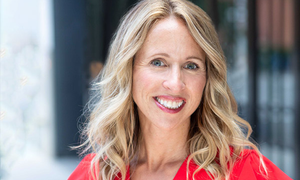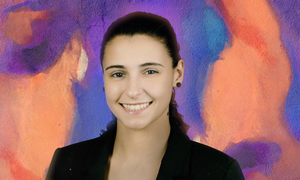My Cannabis Career is a series of interviews featuring people in the cannabis industry. These stories illuminate diverse cannabis career paths, share learnings from strategic actions taken along the way, and provide insights into a green future.
Alexander Farnsworth founded Farnsworth Fine Cannabis to bring the rich history of cannabis into our modern industry. The dispensary is redefining luxury smoking, offering new products like Fine Cannabis Cigarettes, Polished Hummingbird Necklaces with Diamond Eyes, and Lavender Body Oil.
Alexander is also a founder of the Queer Cannabis Club, a group that embraces and advocates for the intersection of cannabis and queerness.
Read on for Alexander’s full cannabis career story from growing up in Utah to finding himself in New York to building the Farnsworth Fine Cannabis brand with his brother and sister.
When did you first try cannabis?
I grew up in “Mormonville,” Utah. The conservative, religious culture of my town instilled a deep fear of getting caught doing something wrong. That fear made me hesitant to even try cannabis, but eventually, I ended up smoking out of an apple in a car with the sunroof down at around age 15.
This was a time when I was rebelling from normal, structured classes. I knew I didn't fit in culturally, and I immediately connected with the effects of cannabis.
Cannabis freed me from my reality.
How did you end up in the cannabis industry?
I escaped Utah and moved to New York City. From there, I visited the Berkshires for the first time about 10 years ago, right around the time Colorado legalized adult use. It was also around the time that New York legalized same-sex marriage, but gay marriage was still illegal federally.
In this time of shifting perceptions, I mentally drew a comparison between gay marriage being illegal and cannabis being illegal. They are two things I knew with certainty that should have never been illegal.
So I visited the Berkshires in the midst of this cannabis and same-sex marriage controversy. What I noticed immediately was that Great Barrington is almost like a mini Park City. There’s a little sloping street, an international film festival, and great food. One of my first thoughts was, “This would be the perfect place for a pot shop.”
At the time, I was working for hotelier André Balazs. I was helping him create event spaces in New York, LA, and Miami — where you have an intersection of hospitality, art, food, fashion, music, and lifestyle. Working in this environment turned me on to what I call “opportunities of place."
I was also turned on by the idea of resistance. Everyone told me at that time NOT to open a dispensary. The pushback just fueled my fire.
Four years later, Massachusetts legalized cannabis. I had been locally active (alongside my partner) to push for cannabis de-stigmatization in Massachusetts. The green wave was rising in the East. I finally had my chance to open a dispensary, so I took it.
What challenges did you encounter during the process of opening your first dispensary?
The process was far from easy, but luckily we were prepared in a lot of the right ways to bring our concept to life.
We brought a very New York idea to Great Barrington; this luxury, high-end cannabis retail storefront and brand. It was a risk because I wasn’t sure how that concept was going to play out in the location.
It was also helpful that I was joined by my brother, who is a chemist and biomedical engineer and had been working in the cannabis industry out in Oregon. He brought his knowledge and experience from the west coast cannabis market and we made Farnsworth Fine Cannabis a family-owned and operated business.
The construction process took us over a year due to Covid delays and state inspections. Plus, we are a very design-focused and creative-focused brand. We spent a lot of time and energy on the physical look of the retail shop. Having gone through that process of building out a dispensary, I now understand why so many of them have traditionally felt pretty lackluster.
It's hard to jump through all the regulatory hoops when building a dispensary. The design components can’t happen on parallel tracks. You start one portion of the design and then you wait on inspections and then you layer onto it. But I think that we found a lot of inspiration throughout the process.
Another unexpected, last-minute challenge was with our original name, “Highminded”. We had already purchased a fancy domain and IP around the brand. Then, at the 11th hour, the state came back and said we couldn’t use the word “high” in our name.
We had to rebrand overnight. We decided to use our last name – Farnsworth. This was also the point that our brand’s identity truly revealed itself.
Our brand became an extension of the legacy of our Great Great Uncle, Philo Farnsworth, who invented the electronic television.
Philo’s story is one that is undertold. There’s no family fortune and he died pretty much penniless. But our dispensary became a way to honor Philo Farnsworth's legacy and keep his name alive.
What's it like to shop at Farnsworth Fine Cannabis?
We brought heritage to the forefront of our cannabis shop. Our showroom is adorned with vintage radios from our family collection. It ties together our family history with a modern dispensary experience.
We’re also focused on the global history of cannabis in places like Egypt, Japan, and England. This plant has been heavily stigmatized in the U.S., and we often forget that it was once cherished by people across the world.
One way to draw that comparison is to think about the culture of cigar smoking. Cigars have a longstanding association with smoking as an accessory. A fine cigar or crystal ashtray or vintage lighter is a point of emphasis that pairs with high class and culture. But we don’t really associate any of this with smoking cannabis.
To emphasize the luxury cannabis experience, we have vintage Cartier lighters, Sterling silver ashtrays from England, Japanese hash pipes, and we’re selling smoking accessories that frame cannabis for what it is — an experience worth celebrating.
Tell us about launching the Queer Cannabis Club. What’s your goal with the organization?
We launched this initiative called the Queer Cannabis Club (QCC) as a way to support businesses that are actually owned and operated by LGBTQ+ individuals. We have some incredible partners helping to move the QCC forward, such as Cann and Different Leaf.
More recently, we hosted an event with Berkshire Pride, a small local pride organization. We partnered with the brand 1906 and we both made donations to Berkshire Pride.
The focus of these events is to get money into the hands of local organizations.
When I was a closeted 16-year-old boy in Utah, I struggled to find a community or place to go until I found my way to the local Pride center. This is why the Queer Cannabis Club is focused on local organizations as they often have the opportunity to make the largest impact on our youth.
We’ve also donated to larger organizations like The Trevor Project, but I think it’s important to focus our efforts on smaller grassroots groups where the money is going to make an immediate impact.
Queer Cannabis Club is just starting out, but I’m excited by the work we’ve already accomplished for LGBTQ+ folks in cannabis. This is something that will continue to grow and evolve as we see what is most needed by our communities.
How does the idea of “bringing history forward” tie into the LGBTQ+ fight for equity in cannabis?
Cannabis and queerness have always intersected for me, and they’ve intersected many times in history as well.
If you look at how cannabis became legal, you’re going to see a long list of LGBTQ+ advocates at the forefront of this industry. Dennis Peron and Allen Ginsberg are personal heroes of mine and their work should be talked about and represented in today’s growing industry.
That's something that my brother and I were very cognizant of, being two men under the age of 30. We have to pay homage to the people who have been waiting for these days for much longer than we’ve been alive.
If we don't talk about history, whether it's queerness, cannabis, or our Great Great Uncle, Philo Farnsworth, then key aspects of past realities are lost.
Addressing the history that helped to get us where we are is the only way we’re going to get to where we need to be.
Is the cannabis industry failing in its representation of LGBTQ+ communities?
We’re doing a lot right, but we’re moving backward in some regards and I’ll give you an example.
Back when I was forming the concept for the Queer Cannabis Club, Farnsworth Fine Cannabis was considered a minority applicant with the state of Massachusetts (LGBTQ+ owned). And we benefitted from that designation.
When we tried to renew our license with the state this March, they came back and said they no longer see LGBTQ-owned as minority-owned. Because of this, our license fees were doubled and in the four months since, I haven't received a response from the state regarding this change.
Another example is New York — the state where I escaped my Mormon roots and was free to become who I am now. A state and a city that has been a refuge for artists, writers, musicians, immigrants, etc. all over the world.
But New York doesn't acknowledge LGBTQ+ to qualify for their social equity program. Essentially, there's not enough inclusivity in one of the most diverse places in America.
The reality is, cannabis is not as equitable as it preaches.
I’ve seen the potential the industry has though. I left Utah because I wasn't accepted there. I didn't have a place culturally and cannabis gave me reprieve from that. I want that same opportunity to be available to every individual who feels like I did.
Cannabis has the opportunity to be the most inclusive industry and a refuge for all marginalized people.
What’s next for you?
The QCC is in talks about creating an investment fund for queer and diverse brands. We hope to be able to provide that extra layer of support beyond donations and building the community. Keep an eye out for more news, we’re laying some solid groundwork with the Queer Cannabis Club.
For Farnsworth Fine Cannabis, we're expanding our product lineup with an edible. We're super excited to be getting into the edibles territory. We are also in talks about bringing our filtered joints to three new states and expanding our product distribution.
Simultaneously, we're looking at both cannabis retail and product manufacturing in New York. I'm really excited to take the concept and what we built here in the Berkshires and put it on Fifth Avenue or Madison Avenue and bring Farnsworth to a broader audience.
Alexander’s advice:
If you’re looking to make an immediate impact, local advocacy is a great place to start.
It’s scary to leave your hometown, but it’s necessary if the community does not align with who you are.
Take some time to learn about the history of cannabis legalization!
For those in marginalized communities working in cannabis, support each other – there’s room for everyone at the table.
It was a pleasure to hear Alexander’s perspective on cannabis. We can’t wait to visit a Farnsworth Fine Cannabis location in New York City sometime soon!
To support and follow Alexander, you can find him on LinkedIn and Instagram. You can also follow Farnsworth Fine Cannabis and Queer Cannabis Club.




